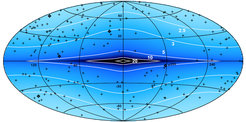“Gravitational noise” interferes with determining the coordinates of distant sources
Proper motions, angular sizes, and trigonometric parallaxes (visible displacements) of astronomical objects such as stars are the basic parameters for many astrophysical studies. These parameters are determined by astrometric techniques, and a coordinate system is needed to calculate, for example, the position or the radial velocity of a star. All coordinate systems which are currently in use, including the International Celestial Reference Frame (ICRF), are based on the coordinates of several hundred “defining” extragalactic sources. Quasars and distant galaxies are ideal reference points for determining the celestial reference frame, as their angular movement is very small, about ten microarcseconds (less than the size of a 1-cent coin on the Moon).
Astrophysical instrumentation is developing rapidly and it is expected that the accuracy of radio interferometric observations will soon reach 1 microarcsecond, and optical observations about 10 microarcseconds. However, with this level of accuracy a new challenge comes into play that interferes with the observations: the general theory of relativity and in particular the deflection of a light beam in a gravitational field.
When a light beam from a distant source passes close to any massive object, it is slightly deflected by its gravity. This deviation is typically very small, but if the beam encounters several objects on its path, the added deviations may become significant. In addition, as the objects are moving, the beam deflection angle changes with time and the source coordinates start to “jitter” around their true value. It is important to note that this “jittering” effect applies to all distant sources, including those that are used as reference points for different coordinate systems. In attempting to improve the accuracy of coordinate reference systems, in the near future we will reach a limit that cannot be exceeded by better detection instruments. In fact, the “gravitational noise” makes it impossible to increase the accuracy of a coordinate system above a certain level.

A map showing the characteristic values of the “jittering” of source coordinates around their true position caused by the Galaxy’s “gravitational noise”. The contours give the absolute values in microarcseconds for a ten-year observation period. The crosses represent the positions of ICRF reference sources.
The group of researchers now tried to estimate the effect of gravitational noise on observations. The study relies on extensive numerical calculations performed by Dr Natalia Lyskova at MPA. She developed a high-performance parallel code and built two-dimensional “deviation maps” of the entire sky based on modern models of the Galactic matter distribution (see figure). The calculations show that for a reasonable observation time of about ten years, the shift in the positions of the sources will vary between 3 microarcseconds at high galactic latitudes up to several dozen microarcseconds close to the Galactic centre.
Consequently, when the accuracy in absolute astrometry reaches microarcseconds, the “jittering” effect of the reference source coordinates due to the Galaxy’s non-stationary gravitational field, will have to be taken into account. But the scientists also have some good news: when investigating the properties of this gravitational noise they were able to demonstrate that the “jittering” effect of the coordinates can be partially compensated by using mathematical methods.
Note: The team includes researchers from the Astro Space Center of P.N. Lebedev Physical Institute (Russia), the Space Research Institute of the RAS (Russia), the Moscow Institute of Physics and Technology (MIPT), and the Max-Planck-Institut fuer Astrophysik (Germany).












